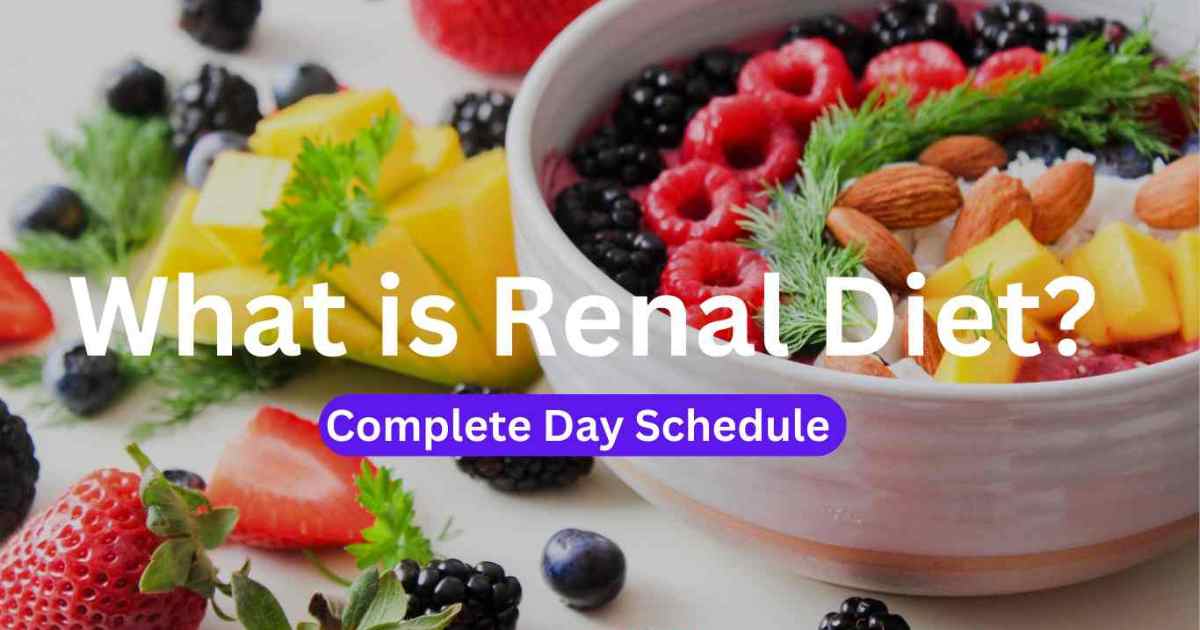Dive into the world of Renal Diet a transformative methodology to nurturing kidney health. Discover the details of this specialized eating plan designed to support those with kidney disease or compromised function. Uncover the secrets of controlling proteins, potassium, phosphorus, and sodium intake while conserving delicious variety. This journey to the best kidney function requires personalized guidance from healthcare experts. Learn how this tailored diet can allow individuals to take control of their well-being, leading to a life of vitality and wellness.


What is a Renal Diet?
A renal diet, also known as a kidney-friendly diet, is a specific eating plan designed to support and manage the health of characters with kidney disease or compromised kidney function. The diet aims to minimize the strain on the kidneys by controlling the intake of certain nutrients and substances that can potentially worsen kidney function or lead to complications.
The primary goals of a renal diet include:
- Controlling Protein Intake: High levels of protein can put stress on the kidneys, so individuals with kidney disease are often advised to limit their protein intake. This helps reduce the amount of waste products that need to be filtered by the kidneys.
- Managing Fluid Intake: Kidney function can impact the body’s ability to regulate fluid balance. In cases of compromised kidney function, fluid retention can become an issue. Therefore, a renal diet often involves monitoring and controlling fluid intake.
- Restricting Sodium (Salt) Intake: Sodium can contribute to fluid retention and high blood pressure, which can further strain the kidneys. A renal diet typically involves reducing salt consumption to help manage these issues.
- Monitoring Potassium and Phosphorus: Kidney function also affects the body’s ability to maintain appropriate levels of potassium and phosphorus. Elevated levels of these minerals can lead to complications, so a renal diet may involve limiting foods high in potassium and phosphorus.
- Consuming Appropriate Calories: Individuals with kidney disease may have changes in their metabolism, so it’s important to maintain a proper caloric intake while ensuring the diet is tailored to their specific needs.
- Balancing Nutrient Intake: A renal diet aims to provide balanced nutrition while considering the limitations and requirements of kidney health. This may involve careful planning of meals and consulting with a healthcare professional or dietitian.
- Monitoring Blood Pressure: High blood pressure can exacerbate kidney issues, so a renal diet often focuses on maintaining healthy blood pressure levels through dietary strategies.
It is important to note that the specifics of a renal diet can vary depending on the individual kidney function overall health and any other present medical conditions. A healthcare provider or registered dietitian with expertise in kidney disease can provide personalized guidance on creating and following a renal diet plan that meets the individuals nutritional needs while supporting kidney health.
Renal Diet Breakfast, Lunch, Dinner
Certainly! Here’s a sample renal diet meal plan for breakfast, lunch, and dinner. Remember that individual dietary needs may vary, so it’s essential to consult a healthcare provider or registered dietitian to create a meal plan tailored to your specific condition.
Breakfast:
Option 1:
- Scrambled eggs (limit the number of yolks)
- Whole grain toast (low-sodium)
- Cooked spinach (limited potassium)
- Apple slices
Option 2:
- Oatmeal cooked with water
- Sliced strawberries
- Low-sodium cottage cheese (in moderation)
Lunch:
Option 1:
- Grilled chicken breast (portioned protein)
- Steamed green beans (limited potassium)
- Quinoa salad with bell peppers and cucumber
- Fresh mixed berries
Option 2:
- Turkey and avocado wrap using a low-sodium tortilla
- Mixed green salad with lemon vinaigrette (limited sodium)
- Carrot and celery sticks
- Low-potassium fruit salad (e.g., apples, pears)
Dinner:
Option 1:
- Baked salmon (portioned protein, high in omega-3s)
- Brown rice (moderate potassium)
- Steamed asparagus (limited potassium)
- Steamed carrots
- Steamed broccoli
Option 2:
- Vegetable stir-fry (tofu or lean protein) with low-sodium sauce
- Quinoa (moderate potassium)
- Sautéed zucchini and yellow squash
- Fresh pineapple chunks (limited portion)
Remember to use herbs and spices for flavoring instead of salt, and opt for cooking methods like grilling, baking, steaming, or sautéing rather than frying. Additionally, portion control is crucial to managing nutrient intake. It’s advisable to work with a healthcare professional or registered dietitian to customize these meal options based on your individual dietary needs and kidney function. They can help you make informed choices that align with your health goals.
Renal Diet Foods


Sure, here are some kidney-friendly foods that are commonly recommended as part of a renal diet:
Protein Sources:
- Lean cuts of poultry (chicken, turkey)
- Fish (salmon, cod, trout) – rich in omega-3 fatty acids
- Eggs (limit the number of yolks)
- Tofu and tempeh
- Low-fat or fat-free dairy products (yogurt, milk, cheese in moderation)
- Beans and legumes (kidney beans, black beans, lentils)
- Nuts and seeds (in moderation)
Grains and Starches:
- White rice
- Brown rice
- Quinoa
- Pasta (in moderation)
- Oatmeal
- Whole wheat bread (low-sodium)
- Corn and corn products
Vegetables (Watch Potassium Content):
- Cauliflower
- Cabbage
- Bell peppers
- Zucchini
- Carrots
- Green beans
- Lettuce and salad greens
- Onions
- Eggplant (limited portions)
- Radishes
Fruits (Watch Potassium and Phosphorus Content):
- Apples
- Berries (strawberries, blueberries, raspberries)
- Pineapple
- Cranberries
- Watermelon (limited portions)
- Peaches and nectarines (limited quantities)
- Red grapes (limited portions)
- Pears (limited quantities)
Dairy Alternatives:
- Low-sodium almond milk or other nut milk
- Low-sodium rice milk
- Low-sodium oat milk
Healthy Fats:
- Olive oil
- Canola oil
- Avocado (in moderation)
- Unsalted nuts and seeds (in moderation)
Fluids:
- Water (limit as advised by your healthcare provider)
- Herbal tea (limit certain types)
- Limit or avoid high-sugar and high-potassium beverages
Seasonings and Flavor Enhancers:
- Fresh herbs (parsley, basil, thyme)
- Spices (cinnamon, ginger, cumin)
- Lemon and lime juice
- Garlic and onion (in moderation)
- Salt substitutes (under medical supervision)
Remember that dietary needs can vary based on your condition and kidney function. Consulting a healthcare provider or registered dietitian with expertise in kidney health is essential to create a personalized renal diet plan that meets your nutritional requirements while supporting your kidney health. They can help you navigate the complexities of potassium, phosphorus, sodium, and fluid management.
Conclusion
Adhering to a tailored renal diet is pivotal for individuals managing kidney disease. By carefully selecting kidney-friendly foods, controlling protein, potassium phosphorus and sodium intake, and maintaining proper hydration one can support optimal kidney function and overall health.
Consulting a healthcare professional or registered dietitian is paramount to crafting a personalized renal diet plan that aligns with individual needs, ensuring a balanced and nutritious approach to managing kidney health challenges.
Join Our Facebook Page Now:
You may also link this post:





